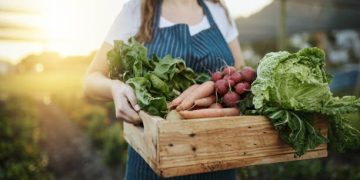Hà Nội is working to improve agricultural product chains to boost economic efficiency for farmers, cooperatives, and businesses while ensuring a supply of safe and high-quality products for both domestic and international markets.
Nguyễn Thị Thu Hằng, Head of the Division of Quality, Processing, and Market Development at the Hà Nội Department of Agriculture and Rural Development, emphasized the importance of these chains in supporting the sustainable development of the agricultural sector.
The Hà Nội Department of Agriculture and Rural Development reports that the capital city currently has 159 certified agricultural and food product chains. Notable examples include the Khu Cháy rice chain, A-Z pork, and the Văn Đức and Thanh Hà safe vegetable chains.
Several successful production chain models are in place, such as a high-quality rice production chain in Ứng Hòa District and a safe vegetable production system in Thanh Trì District. These models represent a shift from small-scale production to linked production systems, focusing on safe production practices and compliance with VietGAP standards to meet the growing demands of both domestic and international markets.
The Thanh Hà Agricultural Production and Service Cooperative in Thường Tín District has developed a high-tech vegetable production chain spanning 1.15 hectares. This cooperative collaborates with other local farming groups to supply nearly one tonne of vegetables and fruits daily to the domestic market, according to Director Bùi Thị Thanh Hà.
In the 2024 spring crop, the Đoàn Kết Production and Service Cooperative in Ứng Hoà District cultivated Japonica rice and other high-quality varieties on 100 hectares, meeting export standards. The cooperative has secured agreements with 2,181 households across ten neighboring cooperatives to purchase all harvested rice, as noted by Director Cao Thị Thuỷ.
To further enhance the effectiveness of agricultural production chains, Bùi Hạnh Hiếu, Director of Bảo Minh Agricultural Products Processing and Trading JSC, suggested that localities should focus on applying safe production methods like VietGAP and GlobalGAP. These practices ensure product quality and facilitate larger consumption contracts with stable pricing.
Hiếu also recommended that Hà Nội prioritize the development of coded growing areas to ensure traceability and transparency of production areas and chains. Phạm Thị Lý, Director of the Centre for Enterprise Integration and Development at the Việt Nam Association of Small and Medium Enterprises, added that partnerships with scientists can help improve product quality and transparency, which is essential for retaining customers.
Furthermore, Hà Nội should support local agricultural products and specialties in participating in fairs and trade promotion programs. The city is encouraged to increase funding from the Hà Nội Agricultural Extension Center and Hanoi Farmers’ Association to help cooperatives and businesses invest in high-tech production chains.
Nguyễn Mạnh Phương, Deputy Director of the Hà Nội Department of Agriculture and Rural Development, highlighted that Hà Nội will continue to develop agricultural production chains by forming large-scale production areas, attracting enterprise investments, and improving management capacity within cooperatives. The city will also monitor supply and demand in both domestic and international markets to adjust production and redirect business strategies as needed. Efforts to promote products through e-commerce platforms like PostMart.vn and Voso.vn, as well as the establishment of stores for safe agricultural products, are also planned.
Get comprehensive supply chain report news updates at The Supply Chain Report. For international trade tools, see ADAMftd.com.
#SupplyChainNews #SupplyChainNews #AgriculturalChains #HanoiAgriculture #SustainableFarming















